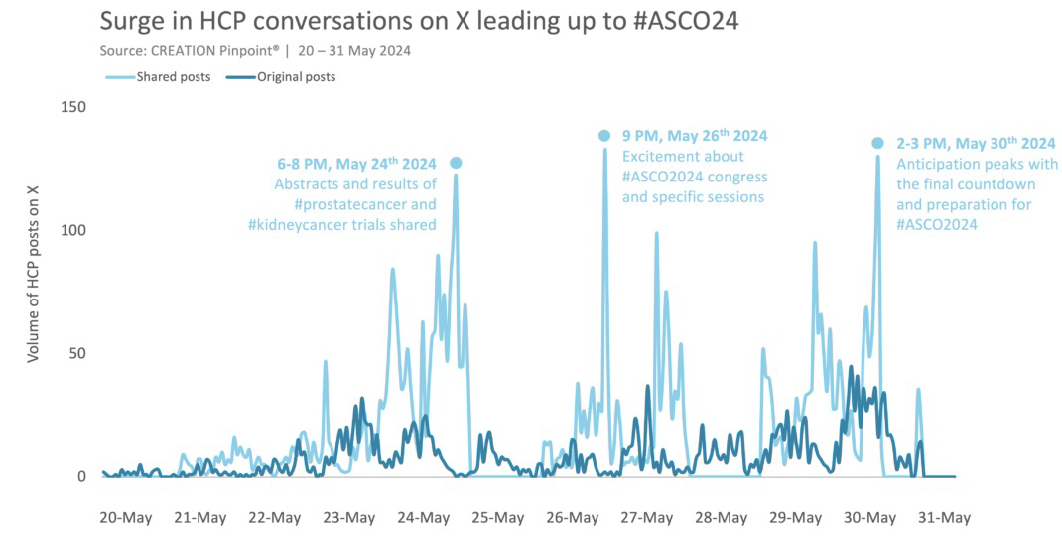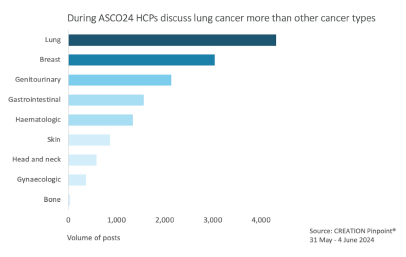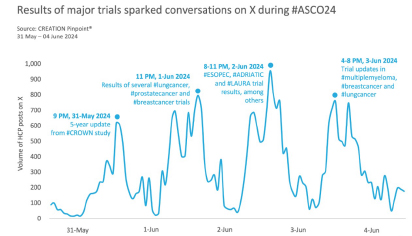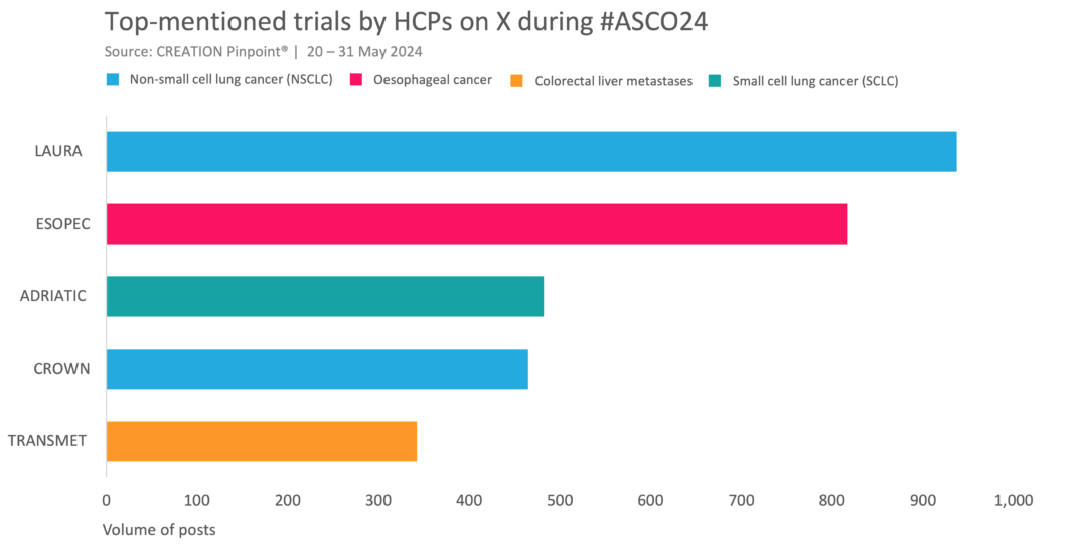The 2024 edition of the American Society of Clinical Oncology (ASCO) Annual Meeting opened in Chicago on May 31 and welcomed more than forty thousand healthcare professionals. Dozens of oncology experts from around the world gathered to discuss, share, and review the latest major advances in cancer research and treatment.
Media commentators hailed the data revealed in the hundreds of presentations throughout the five-day program as “groundbreaking,” “out of the ordinary” and “extremely impressive.”
Beyond the headlines, however, it’s difficult to sift through the conference’s vast coverage to identify the topics, treatments and trials seen as holding the most promise for patients in the years ahead.
However, analyzing the social media conversations of healthcare professionals on the front lines of oncology provides a solution. In the healthcare sector in particular, online conversations offer a source of spontaneous information – an extremely valuable and virtually unlimited opportunity for analysis. Through them, we are able to uncover the unfiltered views, attitudes, and sentiments of the millions of healthcare professionals on the front lines of healthcare delivery.
Leading up to and during ASCO 2024, we listened to online conversations from more than 5,000 healthcare professionals. In total, this analysis exceeded 50,000 messages. The goal was to identify which topics garnered attention, which treatments presented were considered most encouraging, and where healthcare professionals saw potential for practice change or where drawbacks generated hesitation.
Overflowing enthusiasm for promising advances in cancerology
In the weeks leading up to the conference launch, we saw excitement online. Healthcare professionals were eagerly awaiting networking with peers and learn about the most promising advances in oncology. Dr. Tejas Patil compared ASCO to the Cannes Film Festival – “exciting, energetic” and filled with “blockbusters.” Others have compiled detailed lists of abstract presentations to watch for once the meeting begins.

During the conference, discussions around lung cancer were dominant. In fact, it was the subject of more than 4,000 individual messages from health professionals, far more than any other type of cancer.

The results of several “practice-changing” clinical trials in this area have fueled this conversation. One such trial was the LAURA trial – the “blockbuster” that health professionals have been talking about in recent weeks. One described it as “the most awaited“Everyone’s trial for thoracic oncologists.
References to the trial, which showed that AstraZeneca’s osimertinib demonstrated significant improvements in progression-free survival in patients with non-small cell lung cancer (NSCLC), accounted for nearly 1,000 social media posts from healthcare professionals. It proved to be the most-discussed trial of all during the conference. In fact, three of the five most-mentioned trials during the period were those evaluating treatments for various forms of lung cancer.
Breast cancer was the second most-discussed cancer type by healthcare professionals at ASCO. It was mentioned in more than 3,000 healthcare professional publications. Of these, healthcare professionals shared:latest news“on a new blood test to predict cancer recurrence, while others discussed first-line treatments for HER2+ breast cancer. The hashtags #bcsm (breast cancer social media) and #breastcancer were used 684 and 561 times, respectively, by healthcare professionals.
Genitourinary cancers, including bladder, kidney and prostate cancers, came in third. During these conversations, health professionals acknowledged positive results combinations of drugs for bladder cancer and Underlines data from the CheckMate 901 trial, which showed higher long-term survival rates after cisplatin treatment.
Going further: healthcare professionals’ responses to major trials

Beyond simply identifying the number of publications discussing trials presented at ASCO, we also dug deeper into what this conversation entailed.
Consider, for example, the results of the LAURA trial, which were presented by Dr. Suresh S. Ramanlingam to a “rousing ovation” from those in attendance. On social media, the immediate response from healthcare professionals to the results was overwhelmingly positive. Many hailed the “massive”, “impressive“, and the “incredible” benefits of the treatment in terms of progression-free survival.
Others have gone even further – Dr Sandip Patel called the trial a “practice of change“, Dr. Percy Lee as “A huge victory for patients“, while Dr Nagashree Seetharamu described the results as “breathtaking“.
Despite this sense of optimism, there was also some apprehension. Some health professionals expressed concern due to the lack of mature data on overall survival of treatment. A small number feared that there may have been underestimation of a significant proportion of patients in the placebo group, leading to a potentially exaggerated disparity in PFS statistics between osimertinib and placebo.
Overall sentiment, however, remained overwhelmingly positive. Since the conference, osimertinib has been granted Priority Therapy and Breakthrough Therapy designations by the FDA, which are designed for drugs that “provide significant improvements over available options” and treatments “intended to treat a serious disease and address a significant unmet medical need.”

Our analysis found that healthcare professionals responded equally positively to the two other most-discussed lung cancer trials at ASCO 2024 – ADRIATIC (AstraZeneca’s Imfinzi (durvalumab)) and CROWN (Pfizer’s Lorbrena (lolartinib)).
In response to the latter, among more than 400 other mentions from health professionals, Dr Charu Aggarwal described the trial data as “truly historical“, offering a “new standard of care” in the field of treatment.
Among 465 messages referring to the latter, health professionals praised the “real success” from the CROWN trial, which reported the longest progression-free survival benefit in metastatic NSCLC. Oncologist Dr Giannis Mountzios said the study “sets a new benchmark in precision oncology.“
Beyond large trials: healthcare professionals are interested in artificial intelligence in oncology
Discussions among health professionals also focused on the role of artificial intelligence in cancer treatment.
Appearing in over 400 posts, much of the discussion focused on recognizing the “transformative role“AI could play a role in prostate cancer treatment. A talk by Dr. Irbaz Riaz on the topic, which focused on the potential of AI to address challenges in selecting systemic treatments, attracted particular attention. Online healthcare professionals welcomed the “fantastic” And “fascinating” session, while another highlighted the “excellent work“Dr. Riaz’s research in advancing prostate cancer evidence synthesis using generative AI.
Other discussions from healthcare professionals around the role of AI in cancer treatment included reference to a presentation on how AI is impacting pathological determinationswhat future implications might exist for biomarkers and how AI in digital pathology has shown “promise“to predict treatment outcomes for advanced gastroesophageal cancer.
Other healthcare professionals have used social media to share educational sessions exploring the use of AI in cancer researchand noted how AI can bridge communication gaps to improve patient-practitioner relationships.
What does all this mean?
ASCO 2024 showcased a fascinating array of developments in oncology. From “groundbreaking” and “truly historic” new trials to transformative artificial intelligence capabilities, the future of cancer treatment looks bright.
By listening to the conversations of health professionals on social media throughout meetings like these, we can identify, interpret and apply the key attitudes of those on the front lines of ensuring this future.


